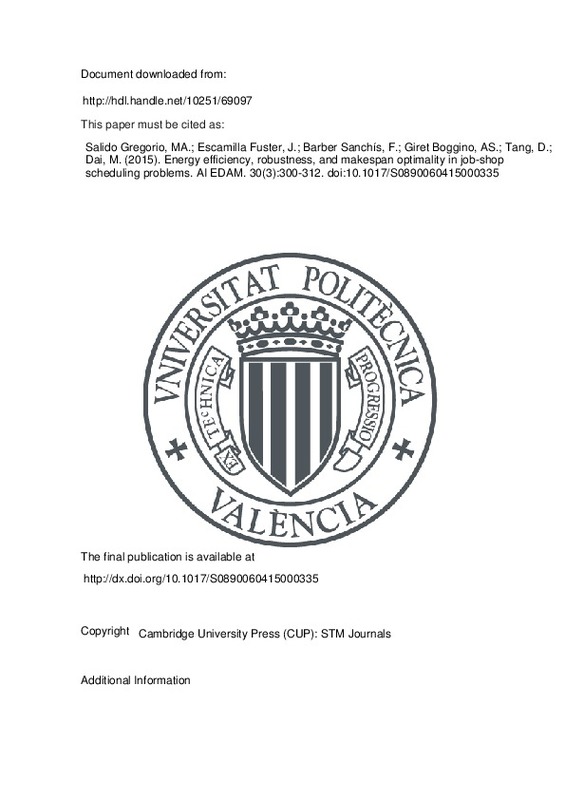Billaut, J.-C., Moukrim, A., & Sanlaville, E. (Eds.). (2008). Flexibility and Robustness in Scheduling. doi:10.1002/9780470611432
Nowicki, E., & Smutnicki, C. (2005). An Advanced Tabu Search Algorithm for the Job Shop Problem. Journal of Scheduling, 8(2), 145-159. doi:10.1007/s10951-005-6364-5
Agnetis, A., Flamini, M., Nicosia, G., & Pacifici, A. (2010). A job-shop problem with one additional resource type. Journal of Scheduling, 14(3), 225-237. doi:10.1007/s10951-010-0162-4
[+]
Billaut, J.-C., Moukrim, A., & Sanlaville, E. (Eds.). (2008). Flexibility and Robustness in Scheduling. doi:10.1002/9780470611432
Nowicki, E., & Smutnicki, C. (2005). An Advanced Tabu Search Algorithm for the Job Shop Problem. Journal of Scheduling, 8(2), 145-159. doi:10.1007/s10951-005-6364-5
Agnetis, A., Flamini, M., Nicosia, G., & Pacifici, A. (2010). A job-shop problem with one additional resource type. Journal of Scheduling, 14(3), 225-237. doi:10.1007/s10951-010-0162-4
Mouzon, G., Yildirim, M. B., & Twomey, J. (2007). Operational methods for minimization of energy consumption of manufacturing equipment. International Journal of Production Research, 45(18-19), 4247-4271. doi:10.1080/00207540701450013
Weinert, N., Chiotellis, S., & Seliger, G. (2011). Methodology for planning and operating energy-efficient production systems. CIRP Annals, 60(1), 41-44. doi:10.1016/j.cirp.2011.03.015
Duflou, J. R., Sutherland, J. W., Dornfeld, D., Herrmann, C., Jeswiet, J., Kara, S., … Kellens, K. (2012). Towards energy and resource efficient manufacturing: A processes and systems approach. CIRP Annals, 61(2), 587-609. doi:10.1016/j.cirp.2012.05.002
Laborie P. (2009). IBM ILOG CP Optimizer for detailed scheduling illustrated on three problems. Proc. 6th Int. Conf. Integration of AI and OR Techniques in Constraint Programming for Combinatorial Optimization Problems, CPAIOR09.
Dahmus J. , & Gutowski T. (2004). An environmental analysis of machining. Proc. ASME Int. Mechanical Engineering Congr. RD&D Exposition, Anaheim, CA.
Huang, K.-L., & Liao, C.-J. (2008). Ant colony optimization combined with taboo search for the job shop scheduling problem. Computers & Operations Research, 35(4), 1030-1046. doi:10.1016/j.cor.2006.07.003
IBM. (2010). Modeling With IBM ILOG CP Optimizer—Practical Scheduling Examples (white paper). Armonk, NY: IBM Software Group.
Kramer L. , Barbulescu L. , & Smith S. (2007). Understanding performance tradeoffs in algorithms for solving oversubscribed scheduling. Proc. 22nd Conf. Artificial Intelligence, AAAI-07, Vancouver.
Seow, Y., & Rahimifard, S. (2011). A framework for modelling energy consumption within manufacturing systems. CIRP Journal of Manufacturing Science and Technology, 4(3), 258-264. doi:10.1016/j.cirpj.2011.03.007
Li, W., Zein, A., Kara, S., & Herrmann, C. (2011). An Investigation into Fixed Energy Consumption of Machine Tools. Glocalized Solutions for Sustainability in Manufacturing, 268-273. doi:10.1007/978-3-642-19692-8_47
Szathmáry, E. (2006). A robust approach. Nature, 439(7072), 19-20. doi:10.1038/439019a
Fang, K., Uhan, N., Zhao, F., & Sutherland, J. W. (2011). A new approach to scheduling in manufacturing for power consumption and carbon footprint reduction. Journal of Manufacturing Systems, 30(4), 234-240. doi:10.1016/j.jmsy.2011.08.004
Gutowski, T., Murphy, C., Allen, D., Bauer, D., Bras, B., Piwonka, T., … Wolff, E. (2005). Environmentally benign manufacturing: Observations from Japan, Europe and the United States. Journal of Cleaner Production, 13(1), 1-17. doi:10.1016/j.jclepro.2003.10.004
Garrido A. , Salido M.A. , Barber F. , & López M.A. (2000). Heuristic methods for solving job-shop scheduling problems. Proc. ECAI-2000 Workshop on New Results in Planning, Scheduling and Design, Berlín.
Verfaillie G. , & Schiex T. (1994). Solution reuse in dynamic constraint satisfaction problems. Proc. 12th National Conf. Artificial Intelligence, AAAI-94.
Dai, M., Tang, D., Giret, A., Salido, M. A., & Li, W. D. (2013). Energy-efficient scheduling for a flexible flow shop using an improved genetic-simulated annealing algorithm. Robotics and Computer-Integrated Manufacturing, 29(5), 418-429. doi:10.1016/j.rcim.2013.04.001
Neugebauer, R., Wabner, M., Rentzsch, H., & Ihlenfeldt, S. (2011). Structure principles of energy efficient machine tools. CIRP Journal of Manufacturing Science and Technology, 4(2), 136-147. doi:10.1016/j.cirpj.2011.06.017
Mouzon, G., & Yildirim, M. B. (2008). A framework to minimise total energy consumption and total tardiness on a single machine. International Journal of Sustainable Engineering, 1(2), 105-116. doi:10.1080/19397030802257236
Bruzzone, A. A. G., Anghinolfi, D., Paolucci, M., & Tonelli, F. (2012). Energy-aware scheduling for improving manufacturing process sustainability: A mathematical model for flexible flow shops. CIRP Annals, 61(1), 459-462. doi:10.1016/j.cirp.2012.03.084
[-]







![[Cerrado]](/themes/UPV/images/candado.png)


